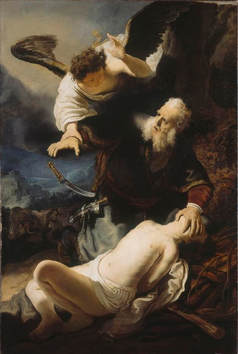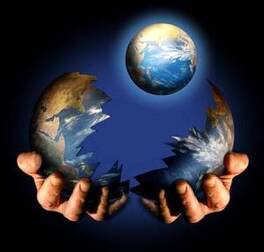
Not all dialogues are over a meal, however. More often than not it’s over tea and biscuits but even this allows for good conversation and a relaxed atmosphere. Just last week I was involved in such a dialogue which was honest and challenging. The focus of the conversation was the story in the Hebrew Bible in which God asks Abraham to sacrifice his only son Isaac, even though God had promised that he would be the father of a great nation.
The story in the Jewish tradition is known as the Akedah – the binding of Isaac. It’s seen as a symbol of martyrdom and the supreme example of self-sacrifice in obedience to God’s will. It’s remembered at Rosh Hashanah which, as well as being the New Year, is also a day of judgement and an opportunity to ask for forgiveness for past sins. During the synagogue service Jews pray that God will consider the binding of Isaac and how Abraham suppressed his compassion to perform God’s will with a perfect heart. They ask that God’s compassion and love will override God’s anger and judgement.
The story in the Christian tradition is the same as in the Hebrew Bible but it’s known as the sacrifice of Isaac – foreshadowing for us the sacrifice of Jesus. For Christians the Hebrew Bible is a forerunner to the life of Jesus and characters such as Isaac have been seen over the centuries as a type of Jesus. It’s not possible I think for Christians to read phrases like ‘your only son’, ‘on the third day’ ‘lamb for a burnt offering’ ‘laid it on his son’ and not remember the death of Jesus, described in the Gospels as God’s only son, who carried the wood of his cross and went to his death like a lamb to the slaughter but who rose again on the third day. Now the question is, was the story of Isaac meant to prefigure Jesus or was the life and death of Jesus interpreted in the light of the story of Isaac? No matter what the answer to this might be one of the Jewish participants felt very uncomfortable with this way of looking at scripture – was it an abuse, was it a takeover, was it a distortion? It’s always good when we can be honest with one another but it’s always a challenge to hear such a perspective. It helped me understand that calling the Hebrew Scriptures the Old Testament might be more honest as our different ways of interpreting them is significant and it’s not dismissive or insulting to Jews to call them that.
The story in the Qur’an is similar to that in the Bible. It’s about the sacrifice of Abraham’s son but in this version Abraham sees himself sacrificing his son in a dream and asks him what he thinks. His son tells him to do as God commanded and so they both submit to God. It was of course a test and, in the words of the Qur’an, ‘God ransomed his son with a momentous sacrifice’ (ie the ram). The question for Muslims is whether this son is Ishmael, the first born son of Abraham and Hagar or Isaac the son of Sarah? The story doesn’t mention the name of the son but the birth of Isaac is mentioned in a verse after the story of the sacrifice so the Muslim tradition believes it is Ishmael that was to be sacrificed.
Three versions of the same story, more or less. It’s been subject to much debate over the centuries in all the faiths. It’s a difficult story. What does it say about God or Abraham that they would kill their own son? Does it reflect a society which was moving beyond human sacrifice to animal sacrifice? Is it about faith and obedience? Does it contrast religious faith and commitment with familial love? What is more important? When I was growing up it was not unknown for parents to cut contact with their children if they married someone from another Christian denomination, never mind another faith. How heart-breaking this must have been – a heart break that probably never healed but accepted as part of their faith. Now that seems barbaric. I for one see this as inhuman and cannot believe that God would want such a sacrifice. At the same time sacrifice is part of life and we are all called at different times to let go of all that is dear to us. I don’t see this as an agency of God but rather part of life. For some this is truly tragic when it comes as a result of war, terror or disasters but all of us will at some time experience illness, death, the loss of someone dear to us, children leaving home or whatever with the final letting go when we breathe our last. This means the story of Isaac does not just contain religious truth but reflects a human wisdom which in my opinion represents religion at its best.



 RSS Feed
RSS Feed
